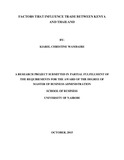| dc.description.abstract | International business comprises of three broad aspects; the participants, activities and
environment. International business has various importance one of it being that it enables
countries to have access to bigger markets, other than its domestic market. It opens up the
boundaries of a country and makes trading accessible to other markets all over the world. It
encourages the wealth generation of a country, this is through increase of income among the
people. It also encourages the purchase of services and goods, which provides revenue to the
government in various forms such as through tax imposition. International business provides a
way through which products and services are more available to various customers. It encourages
and facilitates the exchange of scarce resources between countries. International business
provides an exchange process which serves as a bridge through which countries are united
together for a common cause. International business is important to the economic development
of a country as well as the living standards of its people. Kenya is one of the largest economies in
Eastern and Central Africa. In terms of its international trade profile Kenya is a leading exporter
of agricultural products with agriculture contributing to one of its largest share of the GDP.
Kenya's economy is market-based, with a few state-owned infrastructure enterprises, and
maintains a liberalized external trade system. The country is generally perceived as Eastern and
central Africa's hub for Financial, Communication and Transportation services. Since 1999,
prices for Africa's leading commodity exports have increased noticeably. The price rise was
engendered largely by the rapid growth of Asia's developing countries, notably China and India.
At the same time, the desire of these Asian countries' middle classes for manufactured goods has
been rising. These demand dynamics create important opportunities for Africa's businesses to
increase and diversify exports. They also create the potential for African entrepreneurs to extract
more value locally by further processing commodities before exporting them. Asia is now
Africa's third most important export destination after the European Union and the United States.
Africa's imports from Asia have also grown, but less rapidly than exports. Thailand is the
second-largest economy in South-east Asia and the 34th-largest worldwide. Over the past
decade, the economy has expanded at an average rate of 4.3%. Over the years, however, there
have been large economic swings that have been exacerbated by seasonal changes. The opening
session of the Kenya -Thailand Joint Commission for Bilateral Cooperation between Kenya and
Thailand was concluded in Nairobi 2010. The two countries agreed to cooperate in economic and
investment promotion and trade areas; agreements on double taxation and tax evasion; tourism,
geology and mining; cultural exchange, education, science and technology, agriculture and agroprocessing,
housing, labor, security and health sectors among others. Kenya and Thailand have
done business over the years and different problems have arisen as part of the trade. The
objective of this study was to determine factors that influence trade between Kenya and
Thailand. It provides evidence that will enable better understanding of the trade between the two
countries, how to mitigate challenges involved and ways of strengthening business ties between
Kenya and Thailand. | en_US |

